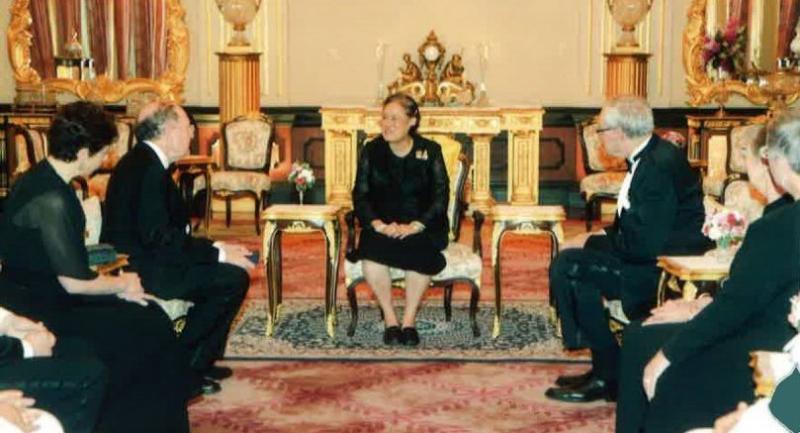Princess gives Prince Mahidol Award to medical researchers

TWO DEDICATED medical researchers, who won the Prince Mahidol Award for 2016, pledged to carry on their research and continue their work to help humanity.
Her Royal Highness Princess Maha Chakri Sirindhorn on Tuesday evening presented the Prince Mahidol Award for 2016 to Sir Gregory Paul Winter and Dr Vladimir Hachinski, the two awardees in the fields of medicine and public health respectively, at Boromrajasathitmaholarn Hall in the Grand Palace.
The Princess then hosted a dinner to honour the laureates.
Sir Winter, Master of UK’s Trinity College University of Cambridge, said he was very surprised and glad that he had been nominated for the Prince Mahidol Award in recognition of his achievements in research to develop humanised therapeutic antibody technologies.
“I think the reason why I was chosen to receive this honourable award is because of the breakthrough in my research on humanised therapeutic antibody technology. However, there are many challenges both from a scientific and economic perspective to overcome and I still carry on with my research,” he said.
He explained that in the past antibodies could not be used to treat humans directly because they were produced from cells extracted from laboratory animals and alien to the human body.
However, the humanisation of antibodies by genetically altering their molecules to model features similar to human antibodies means those antibodies can cure many illnesses in humans.
For instance, humanised antibodies can be developed into therapeutic drugs, which can provide new ways to prevent and treat immune disorders, degenerative diseases and several types of cancer.
“The next scientific challenge for me is to develop smaller humanised antibodies, so they can be better absorbed into the human body,” he said.
“Meanwhile, antibody-based medicines are still very expensive, so another economic challenge is to make these drugs cheaper to enhance the accessibility to these drugs to a wider group of people.”
Hachinski , the awardee in the field of public health, is a distinguished university professor at the University of Western Ontario in Canada. He also expressed similar views about his achievements.
“I am very glad that I was chosen to receive this reward. However, this is not my achievement alone, but the result of the hardwork of my teammates too,” he said.
He said the award gave him a precious opportunity to spread his work on stroke awareness and prevention to the wider public, emphasising that there was no better treatment than prevention and his work on a campaign in Canada had proved prevention was very effective to reduce strokes.
Hachinski and his colleague John W Norris have established the MacLachlan Stroke Unit in Canada, which has proved very effective in preventing and reducing the number of stroke patients. He also coined the term “brain attack” to signify the severity and sense of emergency involved in a stroke and urged people not to ignore the early symptoms of strokes.
“We have worked with the government to promote a stroke-awareness campaign to let people become aware of the warning signs of a stroke, so they can seek medical advice and treatment in time,” he said. He added that during the 12 years of the campaign, statistics showed that severe stroke cases had gradually decreased.
“This campaign can be implemented worldwide to reduce strokes and it could be adopted at all levels of hospitals, including at the smaller ones.”
The Prince Mahidol Award, presented by the eponymous foundation, is given to individuals or institutions that have demonstrated outstanding contributions to the advancement of the world’s medical and public-health services.
Each award consists of a medal, a certificate and a cash reward of US$100,000 (Bt3.5 million). This was the 25th year ceremony since the award was founded in 1992.
